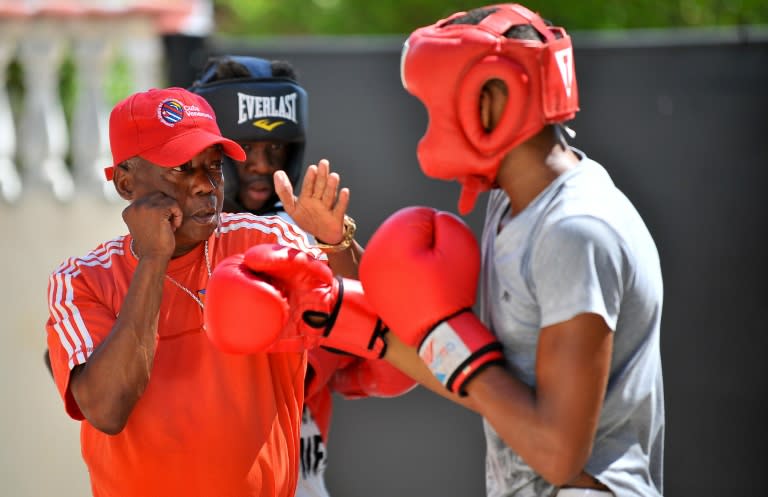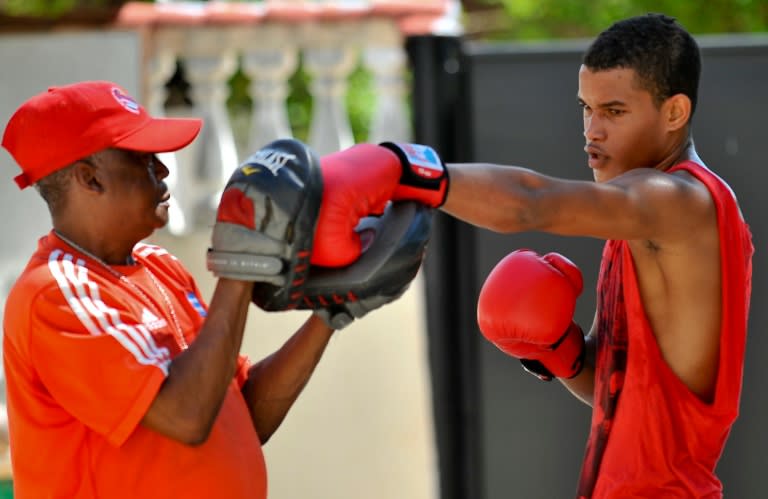Veteran Cuban boxers' knockout nostalgia
Training in the Havana heat, veteran boxer Jorge Hernandez teaches his teenage fighters to hit hard, with the knuckles, the way he used to. Not the way he sees it at the Rio Olympics. When he was a Cuban champion in the 1970s, Hernandez fought for knockouts -- or at least for a stoppage in his favor. Since then, he complains, boxing -- Cuba's top Olympic sport -- has gone downhill. Nowadays, he says, it is all about marking points on the judges' scorecards. In his day fighters like Cuban legend Teofilo Stevenson and American "Sugar" Ray Leonard knocked out opponents. "Boxing is the art of hitting and not getting hit," said Hernandez, dressed in a red tracksuit, as the youngsters sweat in their gloves and head guards. "But to not get hit, you have to move a lot in the ring. That is what makes boxing beautiful." - Cuba's boxing decline - Hernandez is training four youngsters, including his own grandson Jaide, 13, in the yard of his home. It serves as a training space over the summer when many gyms are closed. Yelling, he urges them on to punch the pads ever more fiercely. "Hard, quick and precise." That is how Hernandez sums up the old-school fighting style that has made Cuba the second most successful Olympic boxing nation, after the United States. Cuba has 34 gold medals -- nearly half of the 69 golds it has won in all disciplines. But its boxing star has faded. It has added just three boxing bronze medals so far at the Rio Games. Its old political nemesis the United States has added one. - Champion to youth coach - Hernandez lost just 10 of his 448 competitive fights. He won 17 by knockout and 26 of the bouts were stopped. He won gold in the light flyweight category at the 1976 Montreal Games, beating North Korea's Ri Byong-uk in the final. The same year his countryman Stevenson won heavyweight gold. Leonard won the light welterweight crown. For Hernandez, now 63, those days are gone. "Boxing over the past ten years has declined a lot at world level," he told AFP. "You don't see the judges rewarding a good left hook. What you see are slaps. They're not hitting with their knuckles, they're doing it with their palms. That doesn't get you a knockout." He quit as trainer of the national team 16 years ago. "When I saw that boxing was starting to lose the quality that I had thrived on, I preferred to leave and go home. I started to work with kids in the gym." - Disappointment - When the training session is over, Hernandez and the boys sit down to watch the Olympic boxing on television. Cuban light heavyweight Julio La Cruz, 27, won through to the final with a points victory over France's Mathieu Bauderlique. Hernandez and his young fighters find it boring. Six of the 10 boxers in Cuba's team have been knocked out so far. "In these Olympics the Cubans have been losing. They have disappointed me," said Rodolfo Fuentes. He is one of the fighters in Hernandez's training group, a tall, lean, fast 16-year-old. "One thing I would like to do is discover the world through boxing," he said. "That has been one of my dreams since I was little." Rodolfo wants to be a "Cuban legend" like triple Olympic champion Stevenson. "I prefer boxing the way it was in the old days," he said. "Nowadays boxers don't like copping punches."




